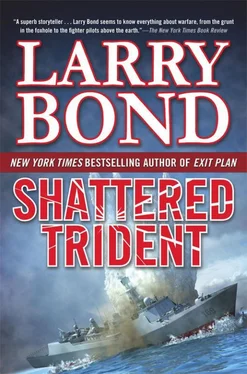“Yes,” Komamura confirmed. “Your attack on Liaoning was possible because your navy has first-line subs, and Chinese anti-submarine warfare is poor at best. In spite of the escort vessels patrolling outside the harbor, your captain was able to penetrate their screen, lay his mines, and withdraw without being detected.”
Gesturing to the other two admirals, Komamura continued, “Japan and South Korea also have first-class submarine arms, at least one and often two generations ahead of their PLAN equivalents. Admiral Kubo has said that the Soryu class, even though it is conventionally powered, would have several advantages over even the Chinese nuclear boats, including quieting, sensors, and weapons.” Kubo silently nodded his agreement.
“I agree,” Park declared. He stood and bowed slightly toward the professor. “This shows great insight. Between our three countries, we can blockade almost every Chinese naval base and catch other units at sea.” His expression had changed completely, his face now alight with the idea. “We can deploy covertly and coordinate our first attacks. Perhaps we can time them to catch Liaoning as they tow it from Yulin to Dalian, and finish her off. We can inflict tremendous damage on the PLAN in the first twenty-four hours. They won’t feel safe outside their own harbors, much less the South China Sea. The shock to their navy, to their leadership, would be tremendous.”
“It would be a humiliation,” Komamura agreed, unhappily, embarrassed, “but I regret to say that this is not the course I envisioned. Even if such an offensive were completely successful, sending our submarines against their fleet would clearly be a classic military conflict, a clash of navies. It’s impossible for our subs to repeatedly attack naval vessels, especially after the initial surprise is lost, without being detected. Even if our boats evade counterattack, detection leads to identification, which would inevitably lead to retaliation.
“China’s political leadership would be compelled to respond, and to the world they would be the aggrieved party. All of our countries are within range of Chinese aircraft and missiles, and we cannot sink enough of their navy to prevent it from actions against our shipping or coastlines. It would still become a wide-scale war.”
Admiral Park clearly wasn’t happy. “It’s a classic matchup of our strength against their weakness. Why wouldn’t it work?”
The professor replied, “Because while anti-submarine warfare is a weakness in the Chinese Navy, it is not a fatal one for China. Her true weakness is her dependence on energy from abroad. If you want to make them feel pain, shut off their oil.”
Nodding toward Admiral Park, Komamura explained, “I agree that a covert deployment and a timed, coordinated offensive is important, but the target should be the merchant ships bound for Chinese ports, specifically, their tankers. Their economy is balanced on a knife’s edge. It would not happen overnight, but halting their oil imports will hurt them badly. They can compensate, at least at first, but the compensation itself will trigger other problems.”
“Why wouldn’t they respond to an attack on merchants the same as attacks on their navy?” Park countered.
“Because a merchant has no way to detect the identity of its attacker,” the professor answered. “Until China can supply proof of nationality, it will be reluctant to act overtly, especially since two of our members are U.S. allies. There is historical precedent. During the Spanish Civil War, unidentified ‘pirate’ submarines sank Soviet merchant ships bringing supplies to the Republican forces. They were Italian subs, but while there were suspicions and accusations, the Russians could never provide proof.”
“That can’t last forever,” Park argued.
“It won’t last long,” Hieu agreed. “And China won’t wait to act. There will be covert responses against anyone she suspects. And we all have merchant ships, too.”
“Every day of uncertainty is a day we’re hurting them and they’re not hurting us,” Kubo answered. “We can even leak suspicions that the ‘first’ merchant ship lost, Vinaship Sea, was caused by a Chinese attack. And we can pull our merchants out of harm’s way and effectively embargo trade with China at the same time. That will deny her strategic materials, sophisticated machinery and electronic imports.”
“How long will it take for her economy to show the effects?” Hieu asked.
Komamura felt more comfortable with this question, and he’d researched it carefully. “They have a strategic oil reserve of ninety days at their normal consumption rate, but they’ve already started using it because of shortfalls in their oil imports,” he explained. Seeing their faces, he quickly added, “But we will not have to wait that long. Oil prices will spike. That will cause pain by itself, and then China will see her shipping costs increase by as much as fifty percent. Together, these will cause great stress. Shortages will quickly affect many sectors of their economy.”
“And your goal?” Kubo prompted, as if he knew the answer.
“At least a recession, and preferably an economic depression.” Even as its author, Komamura hated the sound of it. Economists wanted to fix things, not wreck them.
“Not a collapse?” Park asked.
“No, Admiral,” Komamura quickly responded, “that would be a disaster for all of us. Famine and civil unrest in the largest nation on earth? It could create the greatest humanitarian disaster in history, and nobody can predict the political consequences.” He spoke with great intensity. How many would die? What would China’s leaders do to stave off famine?
“It would replace greed with desperation,” the professor explained. “I believe it is enough to give China’s leaders a new set of long-term problems.”
Park looked thoughtful. “And we do not attack PLAN vessels.”
Komamura shrugged. “Except in self-defense, of course. We must do our best not to give the Chinese an opportunity to play the victim on the world stage. Their submarines are a special case. We shouldn’t go looking for them, but since they can attack our merchant ships, if one of our subs meets one, we should sink it.”
“When should we start this campaign?” Hieu asked.
“Now. This very minute.” Komamura felt the intensity return. “Damaging their carrier threw their plan into disorder, but nobody believes they have abandoned their goal entirely. In that case, the sooner we close the valve, the better.”
“This means more than just sending out our submarines,” Park argued. “Our armed forces have to be prepared, our merchant ships diverted. If there’s to be an embargo, we should be stockpiling critical materials.”
“Any visible action may warn China,” Komamura countered. “I recommend sending out your submarines immediately, but take no other detectable action until Chinese merchant ships begin sinking. After that happens, your actions can be explained as reactions to those events.”
Komamura took the time to study the reaction of each delegation. He saw general agreement with the plan, but the import and scope of the consequences were just now becoming clear. Having heard Komamura’s plan before, Kubo was calmest. Park looked thoughtful, but his aide was writing at a furious pace.
Hieu’s face was hard, almost angry. “Our nation has been at war since Banh Mi mined the carrier,” he declared. “All three of our submarines will be under way within the hour. The rest of our armed forces have been quietly preparing. If this conference had not ended as it has, we were prepared to begin the struggle ourselves. We have fought and won against powerful enemies before.”
Читать дальше

![Никки Сикс - Героиновые дневники. Год из жизни павшей рок-звезды[The Heroin Diaries - A Year in the Life of a Shattered Rock Star]](/books/78612/nikki-siks-geroinovye-dnevniki-god-iz-zhizni-pavshej-rok-zvezdy-the-heroin-diaries-a-yea-thumb.webp)










